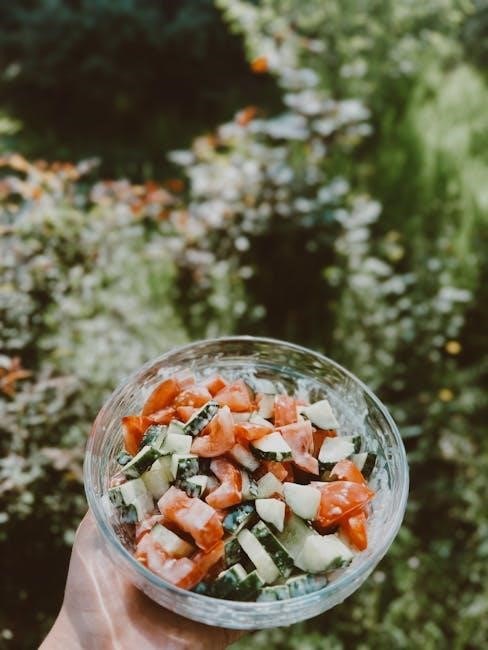
lymphedema diet pdf
Lymphedema is a chronic condition characterized by abnormal fluid buildup in tissues, often due to lymph node damage. Diet plays a crucial role in managing symptoms and supporting lymphatic health, alongside other therapies like compression garments and exercise. A well-structured diet helps reduce inflammation, maintain a healthy weight, and improve overall well-being, making it an essential component of lymphedema management.
1.1 What is Lymphedema?
Lymphedema is a chronic condition characterized by abnormal fluid buildup in soft tissues, often in the arms or legs. It typically results from lymph node damage, commonly due to surgery, radiation, or cancer. This disruption impairs the lymphatic system’s ability to drain fluid, leading to swelling and discomfort. Lymphedema requires ongoing management to reduce symptoms and improve quality of life.
1.2 The Importance of Diet in Managing Lymphedema
Diet is a cornerstone in managing lymphedema, as it helps reduce inflammation, maintain a healthy weight, and support lymphatic function. A balanced diet rich in anti-inflammatory foods, lean proteins, and whole grains can alleviate symptoms, while avoiding high-sodium and processed foods minimizes fluid retention. Proper nutrition complements other therapies, enhancing overall well-being and quality of life for individuals with lymphedema.
Understanding the Lymphedema Diet
The lymphedema diet focuses on whole, nutrient-rich foods, lean proteins, and healthy fats, while minimizing processed and high-sodium options to support lymphatic health and reduce swelling.
2.1 Key Principles of the Lymphedema Diet
The lymphedema diet emphasizes whole, unprocessed foods, lean proteins, and healthy fats to reduce inflammation and support lymphatic function. It prioritizes hydration, limits sodium, and balances nutrients to manage swelling and promote overall health. Avoiding sugary, high-sodium, and processed foods is crucial, while incorporating anti-inflammatory and fiber-rich options helps maintain a healthy weight and improve symptoms.
2.2 How Diet Impacts the Lymphatic System
Diet directly influences lymphatic health by affecting inflammation, fluid balance, and lymph flow. Anti-inflammatory foods reduce swelling, while high-sodium and processed foods can worsen fluid retention. Adequate hydration supports lymphatic circulation, and fiber-rich foods promote digestive health, enhancing nutrient absorption and waste removal. A balanced diet helps maintain lymphatic efficiency, reducing the risk of complications and improving overall well-being.
Recommended Foods for Lymphedema Management
Foods rich in antioxidants, omega-3 fatty acids, and fiber, such as fatty fish, leafy greens, and berries, help reduce inflammation and support lymphatic health. Incorporating lean proteins, whole grains, and staying hydrated are also essential for managing lymphedema effectively.
3.1 Anti-Inflammatory Foods
Anti-inflammatory foods are key in managing lymphedema. Fatty fish like salmon and mackerel, rich in omega-3s, reduce inflammation. Leafy greens such as spinach and kale, along with berries, also offer anti-inflammatory benefits. Including turmeric and ginger in meals can further help reduce swelling. These foods support lymphatic health and overall well-being when incorporated into a balanced diet, aiding in symptom management and inflammation reduction.
3.2 High-Protein Foods
High-protein foods are essential for maintaining tissue repair and strength in lymphedema management. Lean proteins like chicken, turkey, and fish support muscle health without adding excess fat. Plant-based options such as beans, lentils, and tofu are also beneficial. Greek yogurt and eggs provide additional protein sources, aiding in muscle repair and overall lymphatic function, which is crucial for reducing swelling and promoting healing.

Foods to Avoid
High-sodium, processed, and high-fat foods can exacerbate lymphedema by promoting inflammation and fluid retention. Limiting these helps reduce swelling and supports overall lymphatic health effectively.
4.1 High-Sodium Foods
High-sodium foods can worsen lymphedema by increasing fluid retention and swelling. Limit processed snacks, canned goods, and restaurant meals, as they often contain excessive salt. Opt for low-sodium alternatives and season foods with herbs instead of salt to reduce sodium intake without compromising flavor. Monitoring sodium consumption helps mitigate fluid buildup and supports lymphatic health effectively.
4.2 Processed and High-Fat Foods
Processed and high-fat foods, such as fried foods, pastries, and processed meats, should be avoided as they contribute to inflammation and worsen lymphedema symptoms. These foods can impair lymphatic function and lead to weight gain, exacerbating swelling. Opting for lean proteins, whole grains, and healthy fats supports lymphatic health and reduces inflammation, aiding in effective symptom management and overall well-being.

The Role of Hydration
Hydration is essential for lymphatic function, aiding toxin removal and fluid balance. Drinking sufficient water helps reduce swelling and supports overall lymphedema management effectively daily.
5.1 Importance of Water Intake
Adequate water intake is vital for maintaining lymphatic flow and preventing fluid stagnation. Proper hydration helps flush toxins, reduce swelling, and support immune function. Drinking enough water ensures the lymphatic system operates efficiently, which is crucial for managing lymphedema symptoms effectively. Staying hydrated is a simple yet essential step in overall lymphedema care and management strategies.
5.2 Avoiding Diuretics Like Caffeine and Alcohol
Avoiding diuretics such as caffeine and alcohol is crucial for managing lymphedema. These substances can dehydrate the body, disrupting fluid balance and increasing swelling. Caffeine and alcohol impair lymphatic function, potentially worsening symptoms. Limiting or eliminating these diuretics helps maintain proper hydration and supports the lymphatic system, reducing the risk of fluid retention and promoting overall well-being.

Weight Management and Lymphedema
Weight management is vital for lymphedema patients. Excess weight can worsen swelling, while a balanced diet helps maintain a healthy body weight, reducing lymphatic strain.
6.1 Achieving a Healthy Body Weight
Achieving a healthy body weight is crucial for lymphedema management, as excess weight can exacerbate swelling and strain the lymphatic system. A balanced diet focusing on whole foods, lean proteins, and fiber helps maintain weight. Portion control and regular meals prevent overeating, while avoiding processed foods supports overall health. Consulting a healthcare provider ensures personalized weight goals and strategies.
6.2 Portion Control and Balanced Meals
Portion control is vital for managing lymphedema, as overeating can lead to weight gain and increased swelling. Balanced meals should include lean proteins, whole grains, and fiber-rich vegetables to support lymphatic function. Avoiding oversized portions and limiting processed foods helps maintain a healthy weight and reduces inflammation, promoting overall well-being and symptom management.

The Benefits of Fiber
Fiber supports a healthy digestive system, reduces inflammation, and aids in satiety, helping prevent overeating and manage weight effectively, which is crucial for lymphedema control.
7.1 Whole Foods and Their Nutritional Value
Whole foods, including fruits, vegetables, whole grains, lean proteins, and healthy fats, provide essential nutrients, fiber, vitamins, and minerals. These foods support the lymphatic system by reducing inflammation and aiding digestion. Incorporating a variety of colorful fruits and vegetables ensures a broad intake of antioxidants and phytochemicals, which are vital for overall health and lymphedema management. Whole foods also promote satiety and help maintain a healthy weight, further benefiting lymphatic health.
7.2 Fiber-Rich Foods for Satiety and Inflammation Reduction
Fiber-rich foods, such as whole grains, beans, and vegetables, help reduce inflammation and promote satiety, aiding in weight management. High-fiber diets support lymphatic health by improving digestion and reducing fluid retention. Incorporating foods like oats, quinoa, broccoli, and berries can enhance nutritional intake while minimizing inflammation, which is crucial for managing lymphedema symptoms effectively.

The Ketogenic Diet and Lymphedema
The ketogenic diet focuses on high-fat, low-carbohydrate eating, promoting weight loss and reducing inflammation, which may benefit lymphedema patients by improving symptoms and overall health.
8.1 Overview of the Ketogenic Diet
The ketogenic diet is a high-fat, low-carbohydrate, moderate-protein diet that forces the body to burn fat for energy, producing ketones. It promotes weight loss, reduces inflammation, and stabilizes blood sugar, making it a potential adjunct therapy for managing lymphedema symptoms by improving metabolic health and reducing swelling.
8.2 Potential Benefits for Lymphedema Patients
The ketogenic diet may help lymphedema patients by promoting weight loss, reducing inflammation, and improving metabolic health. By minimizing carbohydrate intake and emphasizing fats, it can stabilize blood sugar and reduce swelling. This dietary approach may also enhance lymphatic function and overall well-being, offering a complementary strategy to traditional lymphedema management methods.

Limiting Salt and Sugar
Reducing sodium and sugar intake helps manage fluid balance and inflammation, crucial for lymphedema control. Excessive salt can worsen swelling, while sugars may trigger inflammation and complicate symptoms.
9.1 Reducing Sodium Intake
Reducing sodium intake is vital for managing lymphedema, as excessive salt can worsen fluid retention and swelling. Limit sodium-rich foods like processed meats, canned goods, and restaurant meals. Aim for no more than 2,300 mg of sodium daily. Use herbs and spices for flavor instead of salt, and check food labels to make informed choices.
9.2 Avoiding Refined Sugars
Refined sugars can trigger inflammation and worsen lymphedema symptoms by increasing fluid retention. Limit sugary drinks, pastries, and processed snacks. Opt for natural sources of sweetness like fruits and vegetables, which provide fiber and antioxidants. Avoiding refined sugars helps stabilize blood sugar levels and supports overall lymphatic health, reducing the risk of complications.

The Impact of Omega-3 Fatty Acids
Omega-3 fatty acids, found in fatty fish, nuts, and seeds, reduce inflammation and support lymphatic health. They help alleviate lymphedema symptoms by minimizing swelling and improving circulation naturally.
10.1 Sources of Omega-3 Fatty Acids
Omega-3 fatty acids are abundant in fatty fish like salmon, mackerel, and tuna. Nuts, seeds, flaxseeds, and walnuts are also rich sources. These foods provide essential EPA and DHA, which help reduce inflammation and support lymphatic health, benefiting lymphedema management.
10.2 Anti-Inflammatory Effects of Omega-3s
Omega-3 fatty acids, particularly EPA and DHA, have potent anti-inflammatory properties that help reduce swelling and inflammation in lymphedema. By incorporating fatty fish, nuts, and seeds into your diet, you can harness these benefits, improving lymphatic function and overall symptom management.

Avoiding Trans Fats and Saturated Fats
Trans and saturated fats can worsen inflammation and impair lymphatic function, exacerbating lymphedema symptoms. Reducing their intake helps mitigate inflammation and supports overall lymphatic health effectively.
11.1 Understanding Harmful Fats
Trans fats and saturated fats are detrimental to lymphatic health, as they promote inflammation and impair lymphatic function. Found in processed foods, fried items, and red meats, these fats can exacerbate lymphedema symptoms. Reducing their intake is crucial for minimizing inflammation and supporting the lymphatic system’s ability to drain excess fluids effectively. Choosing healthier alternatives is essential for overall well-being.
11.2 healthier Alternatives to Saturated and Trans Fats
11.2 Healthier Alternatives to Saturated and Trans Fats
Healthier alternatives include unsaturated fats like avocados, nuts, seeds, and olive oil. These fats reduce inflammation and support lymphatic function. Incorporating omega-3 rich foods, such as fatty fish, flaxseeds, and chia seeds, further enhances anti-inflammatory effects. Opting for plant-based fats and lean proteins helps maintain a balanced diet, promoting overall health and lymphedema management effectively.
A balanced lymphedema diet focusing on anti-inflammatory foods, hydration, and avoiding harmful fats is crucial. Combine dietary changes with exercise and compression therapy for optimal lymphedema management.
12.1 Summarizing the Lymphedema Diet Plan
The lymphedema diet focuses on anti-inflammatory whole foods, lean proteins, and omega-3s to reduce swelling and support lymphatic health. Emphasize hydration, fiber-rich foods, and avoid processed, high-sodium, and high-fat items. A balanced approach helps maintain a healthy weight, minimize inflammation, and improve overall well-being, complementing other lymphedema management strategies for better symptom control and quality of life.
12.2 Combining Diet with Other Lymphedema Management Strategies
A comprehensive approach to lymphedema management integrates diet with therapies like compression garments, exercise, and skincare. Complete decongestive therapy (CDT) and manual lymphatic drainage further enhance fluid reduction. Combining these strategies with a tailored diet optimizes swelling control, improves mobility, and enhances overall quality of life, addressing both physical and emotional aspects of lymphedema care effectively.